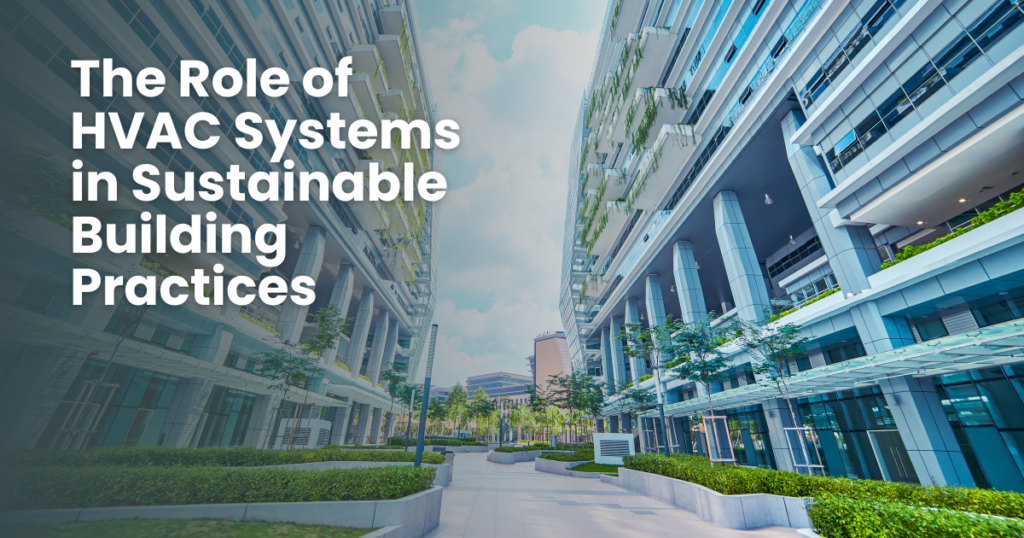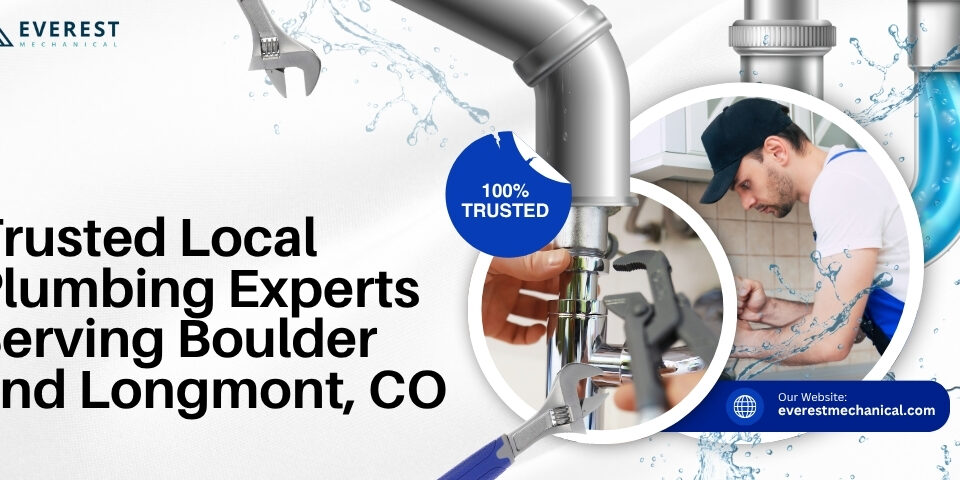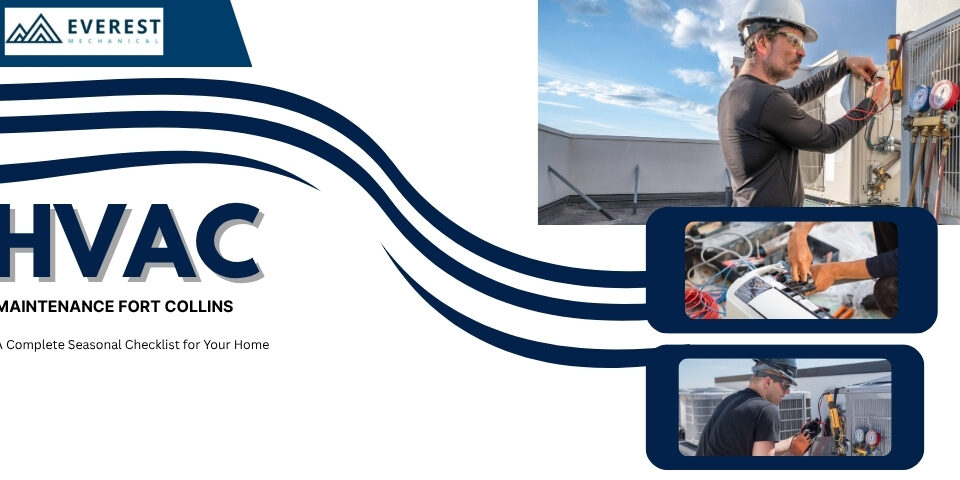- Servicing areas in and around: Estes Park, Longmont, Boulder, Arvada, Fort Collins, Denver, Loveland, and Lyons
- 8883880970
The Role of HVAC Systems in Sustainable Building Practices

What is Sump Pump and its benefits
May 10, 2024
Know How to Improve Indoor Air Quality and Cooling
May 25, 2024The demand for sustainable building practices in the construction industry is larger than ever. Today, the world is facing a serious concern regarding climate change and therefore it has become necessary for buildings to minimize their environmental impact.
Though there are several reasons that lead to a building’s sustainability, HVAC or Heating, Ventilation, and Air Conditioning systems have an important role to play in it.
HVAC systems are often the biggest energy consumers in a building, sometimes accounting for up to 50% of its total energy use. This high energy demand can be linked directly to increased greenhouse gas emissions. However, by implementing sustainable design strategies for HVAC systems, we can significantly reduce a building’s environmental impact as well as also gain economic and health benefits.

Why Are HVAC Systems Important for Sustainable Buildings Practices?
Energy consumed by a building’s HVAC systems directly contributes to its environmental impact. A lot of fossil fuels are used for the generation of electricity that further powers the traditional HVAC systems, and it leads to the emission of huge amounts of greenhouse gases, a major factor that is driving climate change. So, it becomes necessary for commercial building owners to focus on energy-efficient HVAC design. It will significantly contribute to the reduction of our reliance on such energy sources and thus minimize environmental consequences.
When we say energy efficiency, we refer to HVAC systems using less energy but providing the same level of comfort and functionality. Sustainable HVAC design includes various strategies and technologies that help to optimize these system’s energy consumption without compromising indoor comfort.
Different Strategies for Sustainable HVAC Design
Here are some of the efficient Sustainable HVAC design strategies every commercial building must try to integrate:
Building Design and Passive Strategies
The design of the building plays an important role in reducing the demand and usage of HVAC systems. One important factor is the building orientation. If the buildings are properly oriented, then it can maximize the natural daylight intake and help with proper heat gain in winter as well as minimize unwanted solar heat during the summers. On top of that, if there is proper insulation and air sealings throughout the building premises, then it will also help to minimize heat transfer, thus, helping reduce workload on HVAC systems.
Buildings should also use passive heating and cooling techniques where they can utilize natural ventilation strategies such as operable windows, light shelves, etc. These things help to reduce heavy reliance on air conditioning systems. Similarly using thermal mass materials like concrete floors can absorb sufficient heat and radiate it throughout the day to regulate indoor temperature.
Select Energy-efficient equipment
Another important factor is selecting the right equipment. Building owners must choose high-efficiency HVAC equipment for sustainable buildings. This includes equipment that must have Variable Speed Drives that can adjust motor speed to match the real-time heating and cooling requirements. This in turn will help to reduce energy consumption as compared to fixed-speed systems. Programmable thermostats are also advanced features that can customize temperature settings for different times of the day. For example, it will help set different temperatures for when the building is less occupied, thus reducing energy use.
Well, only HVAC equipment is not sufficient to maximize sustainable practices. Additional machinery like heat pumps, geothermal systems, and radiant heating and cooling systems can add to equipment efficiency. While heat pumps can be a great addition that can provide both cooling and heating benefits by extracting heat from the environment and sending it for cooling, geothermal systems also offer highly efficient heating and cooling by minimizing environmental impact to a large extent.
Integrating Smart Controls and Building Automation Features
Building Automation Systems (BAS) are advanced technologies that provide a central platform to control HVAC operations. It comes with several features like:
- Occupancy Sensors: these sensors can easily detect the number of occupants in the building and adjust the temperature setting automatically for unoccupied spaces. Thus, it can reduce unnecessary energy use.
- Demand-Controlled Ventilation (DCV): As the name suggests, these systems are capable of adjusting ventilation rates depending upon the number of occupants and the air-quality in real-time and help optimize ventilation efficiency.
- Remote monitoring and Diagnostics: Now several advanced tools are present that assist in building automation and help manage everything remotely including HVAC performance, maintenance, and help concerned persons identify potential risks that can impact the overall efficiency of HVAC systems.
Every Existing building must also follow preventive measures to ensure sustainable building:
- Regular maintenance of HVAC systems like cleaning air filters, checking for leakages in ductwork, regular inspection, etc.
- Upgrading regular thermostats to smart programmable thermostats that can make temperature control more efficient.
- Commission of HVAC systems to ensure they are running at maximum efficiency.
Benefits of Sustainable HVAC Systems
Here are some potential benefits building owners can reap by using sustainable HVAC systems:
- Reduce impact on the environment as there will be less greenhouse gas emission and better air quality.
- Minimize operating costs for building owners and thus help them save additional costs.
- With better indoor air quality and ventilation, occupants can get better health benefits.
Professional HVAC services for sustainable building
Everest Mechanical is a professional HVAC service company specializing in HVAC installation and repair services. We operate across Colorado and offer a variety of HVAC and plumbing services in Denver, Boulder, Fort Collins, Longmont, Estes Park, and nearby regions.
If you are looking to enhance the sustainability of your commercial building then Everest Mechanical offers perfect HVAC solutions that comprise energy-efficient equipment installation, regular maintenance and repair services,
Our trained and certified technicians aim to provide unmatched service and 100% customer satisfaction. For all your HVAC needs, and contact Everest Mechanical for commercial HVAC services in Colorado.
HVAC systems play a critical role in building sustainability. By implementing sustainable design strategies, we can significantly reduce the environmental impact of buildings while creating economic and health benefits. As technology continues to evolve, we can expect even more innovative and efficient HVAC solutions to emerge, paving the way for a future of truly green buildings with minimal environmental impact.



